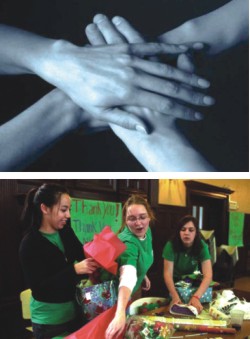|
Impressions
Being a Volunteer
Julian Francis
 Most religions of the world tell us to help those who have less. When I was growing up in London, 50-60 years ago, it was a time after the Second World War when there was a shortage of and rationing of almost everything, food, clothing, petrol etc. At home we ate very simply and ate chocolate only at Christmas and Birthdays. Some rich relations of ours in USA sent us monthly food parcels! Mother told us that there was not enough food to feed everyone, especially the poorest. Most religions of the world tell us to help those who have less. When I was growing up in London, 50-60 years ago, it was a time after the Second World War when there was a shortage of and rationing of almost everything, food, clothing, petrol etc. At home we ate very simply and ate chocolate only at Christmas and Birthdays. Some rich relations of ours in USA sent us monthly food parcels! Mother told us that there was not enough food to feed everyone, especially the poorest.
My mother (to whom I felt very close, only two days ago, on May 27, as it would have been her 96th birthday if she had been alive today) had uncles and great-uncles that had worked in Asia and Africa and had strongly influenced my mother about poverty and the need to assist “those who have less”. With her influence, when I was as young as 9 or 10, I started raising funds for OXFAM, now one of the biggest and much admired overseas development charities of the UK. Fairly soon after the untimely death of my mother, 52, from cancer, Bihar in India was having a severe famine in 1967 and, having qualified in Agriculture and Animal Husbandry, I volunteered to assist in the relief and rehabilitation programmes. And that is how I came in 1968 to the Indian Sub-Continent which has been my home for most of the last 41 years.
To be a good volunteer, you need to be a good observer of who it is that you are trying to assist. You need to have infinite patience to understand how the person in need is feeling and how you can help without taking their personal dignity away. In countries like Bangladesh, there is always a huge amount of volunteerism in every village, every slum. People always rally round to ensure that nobody goes completely hungry.
From 1998 to 2000, I worked with Bangladesh Red Crescent Society that has thousands of volunteers. More than 30,000 are volunteers of the Cyclone Preparedness Programme (CPP) who with cyclones SIDR and AILA have saved thousands of lives by getting people to cyclone shelters in time.
Alongside hundreds of Indian volunteers, I worked closely with the Bangladeshi volunteers who worked tirelessly among nearly 10 million refugees in all the 900 refugee camps in India in 1971. These 'volunteers' were refugees themselves, but they had 'stood up' to organise the cleanliness and safety of the camps, the feeding times, the 'school' times and the cultural activities of song and drama. They have not been recognised as 'Freedom Fighters' as they did not carry rifles, but these volunteers in the camps are some of the finest 'unsung' heroes and heroines involved with the formation of Bangladesh.
Copyright
(R) thedailystar.net 2009 |
